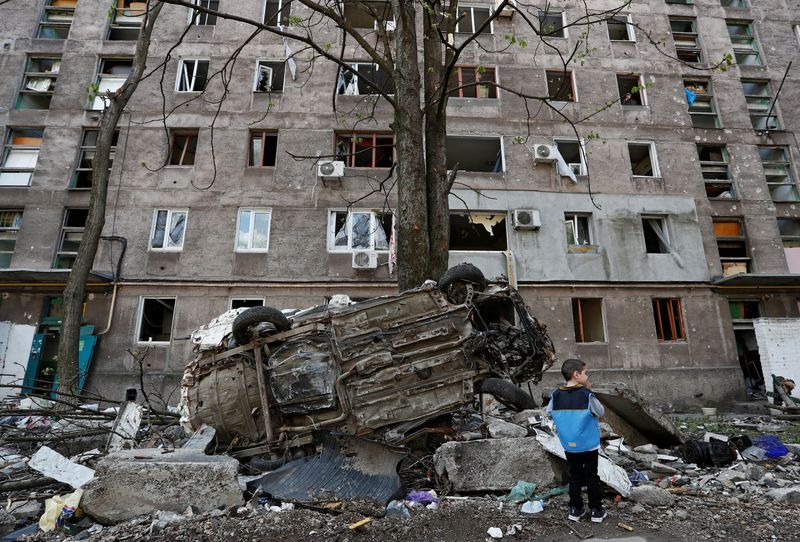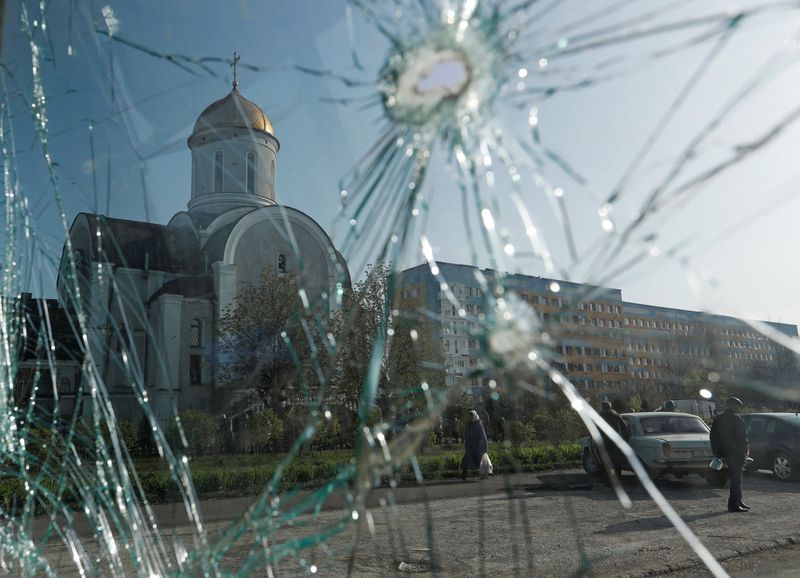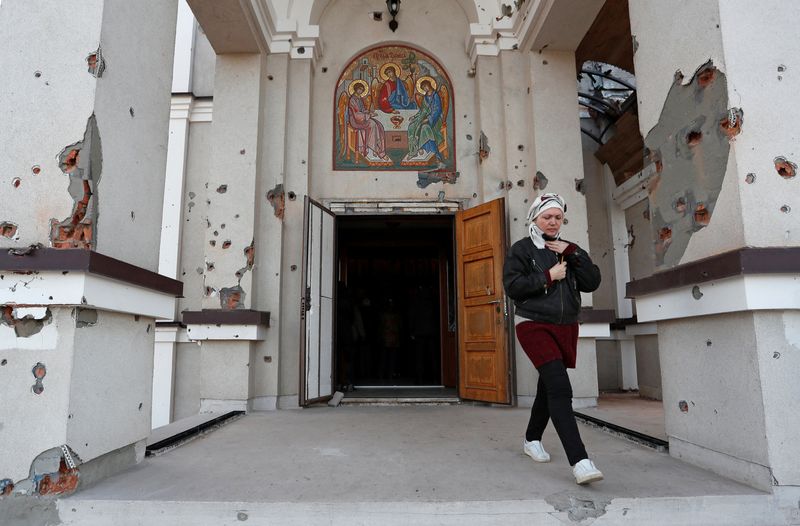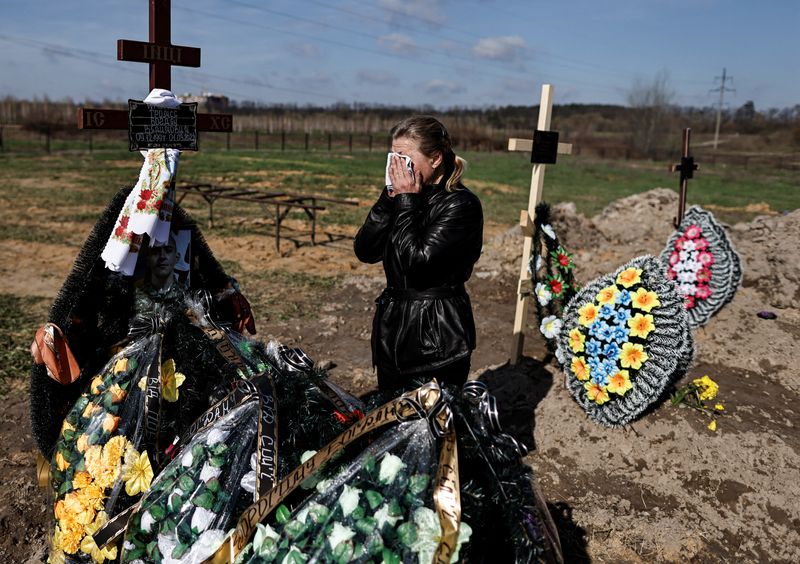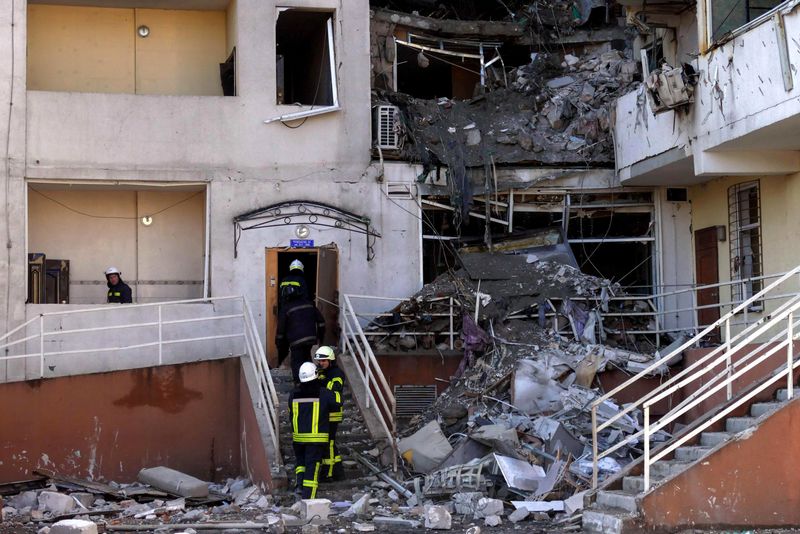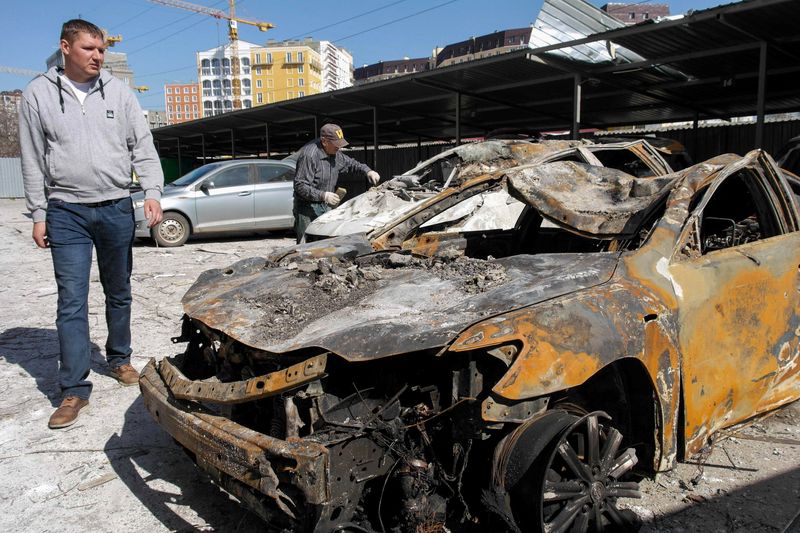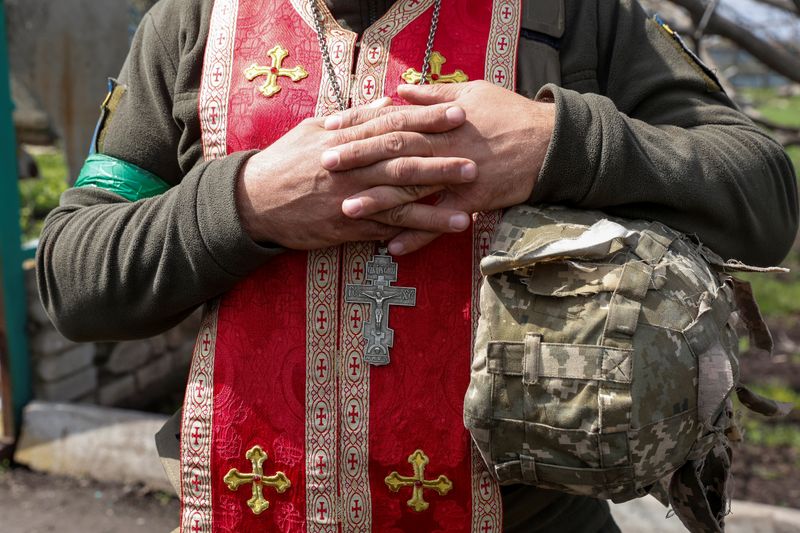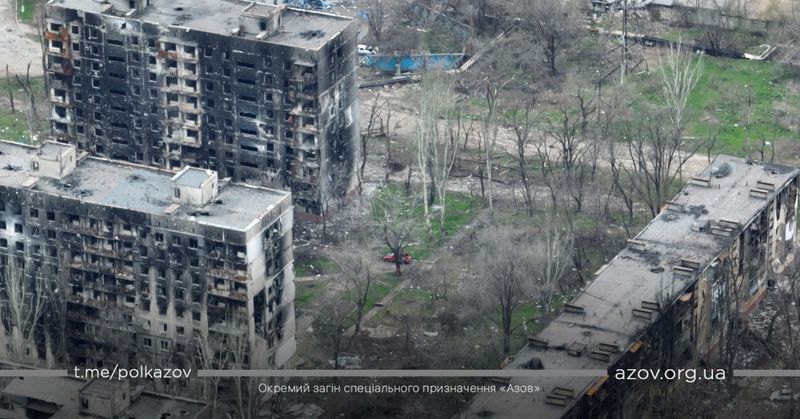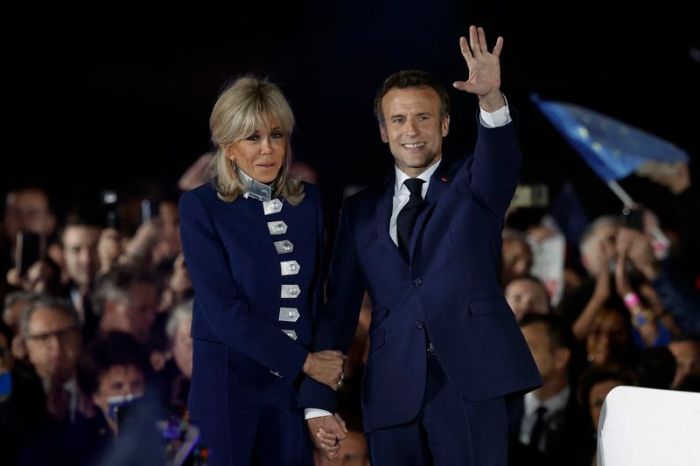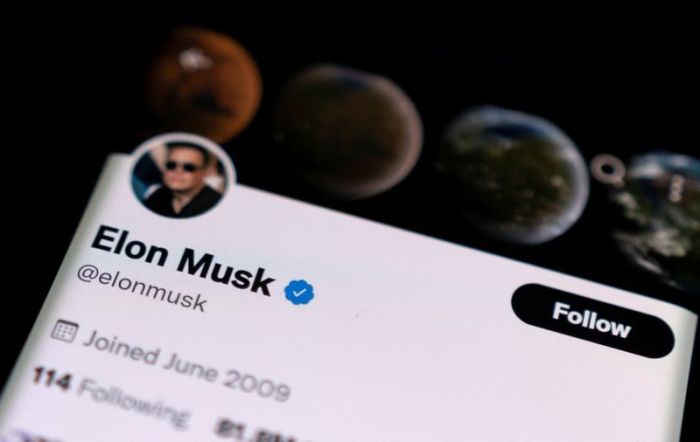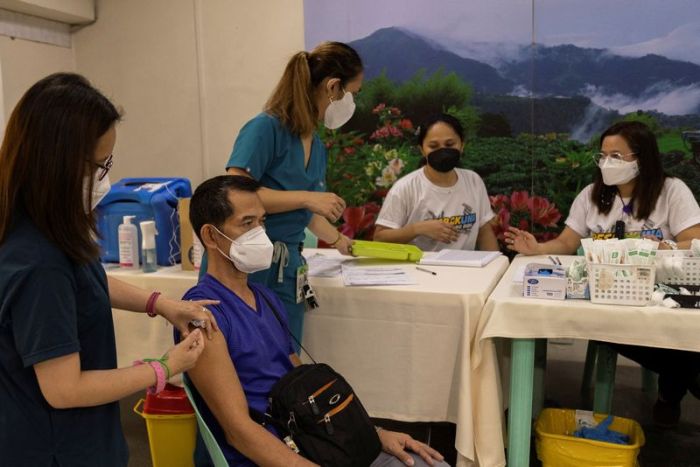KYIV (Reuters) -Ukraine will ask U.S. Secretary of State Antony Blinken and Defence Secretary Lloyd Austin for more powerful weapons during an expected visit by the officials to Kyiv on Sunday as the Russian invasion enters its third month.
Ukrainian President Volodymyr Zelenskiy said his country would overcome “dark times,” in an emotional address at Kyiv’s 1,000-year-old Saint Sophia Cathedral to mark Orthodox Easter as fighting in the east overshadowed the religious celebrations.
The trip by Blinken and Austin, announced earlier by Zelenskiy, would be the highest-level visit to Ukraine by U.S. officials since Russian President Vladimir Putin ordered the invasion of the country on Feb. 24.
The White House has not confirmed any visit, and the State Department and Pentagon declined to comment. But Oleksiy Arestovych, an adviser to Zelenskiy, said late on Sunday in a social media video that Blinken and Austin had arrived in Kyiv and were holding talks with the Ukrainian president.
“We are inspired by the resilience of Orthodox Christians in Ukraine in the face of President Putin’s brutal war of aggression,” Blinken said earlier on Twitter.
Zelenskiy on Twitter thanked U.S. President Joe Biden and the United States for leadership in supporting Ukraine.
After Ukrainian fighters forced a Russian retreat from around Kyiv, Moscow’s assault is now focused on the eastern Donbas region and the south of the country. With a semblance of normal life returning to the capital, several countries have reopened embassies in recent days and some residents who fled the fighting returned for Easter.
Moscow, which describes its actions in Ukraine as a “special military operation”, denies targeting civilians and rejects what Ukraine says is evidence of atrocities, saying Kyiv staged them to undermine peace talks.
Pope Francis called for an Easter truce: “Stop the attacks in order to help the exhausted population. Stop,” he said.
Ukrainian refugees filled churches across central Europe.
“I pray that this horror in Ukraine ends soon and we can return home,” said Nataliya Krasnopolskaia, who fled to Prague from Odesa last month, one of the more than 5 million Ukrainians estimated to have escaped the country.
MORE EQUIPMENT
Ukrainian officials plan to tell Blinken and Austin of the immediate need for more weapons, including anti-missile systems, anti-aircraft systems, armoured vehicles and tanks, Zelenskiy aide Igor Zhovkva told NBC News on Sunday.
The United States and NATO allies have shown growing readiness to supply heavier equipment and more advanced weapons systems. Britain has promised to send military vehicles and is considering supplying British tanks to Poland to free up Warsaw’s Russian-designed T-72s for Ukraine.
Turkish President Tayyip Erdogan said after talks by phone with Zelenskiy that Ankara was ready to assist in negotiations with Russia. Zelenskiy said he discussed with Erdogan the need for the immediate evacuation of civilians from the southern city of Mariupol, the site of the biggest battle of the conflict.
Russian forces attempted again to storm the Azovstal steel plant that is the main remaining Ukrainian stronghold in Mariupol on Sunday, Ukrainian officials said, adding that more than 1,000 civilians are also sheltering there.
Ukraine on Sunday proposed a “special” round of negotiations with Russia to discuss the fate of the civilians and Ukrainian troops still trapped in the city, though Moscow has yet to respond publicly.
The aim of the talks would be to establish an immediate ceasefire in Mariupol, “multi-day” humanitarian corridors, and the freeing or swapping of Ukrainian fighters trapped in the plant, Ukraine’s Arestovych said.
Serhiy Volyna, commander of Ukraine’s 36th Marine brigade forces in Mariupol, said Russia was hitting the plant with air and artillery bombardments.
“We are taking casualties, the situation is critical… we have very many wounded men, (some) are dying … the situation is rapidly worsening,” Volyna said.
Moscow has previously declared victory in the city and said it did not need to take the plant.
Capturing Mariupol would link pro-Russian separatists who control parts of the regions of Donetsk and Luhansk that make up the Donbas with the southern Black Sea peninsula of Crimea, which Moscow seized in 2014.
Ukraine estimates tens of thousands of civilians have been killed in Mariupol and says 100,000 civilians are still in the city. The United Nations and Red Cross say the civilian toll is at least in the thousands.
‘HUMAN TRAGEDY’
Ecumenical Patriarch Bartholomew, the spiritual head of Eastern Orthodox Christians worldwide, called for humanitarian corridors in Mariupol and other areas of Ukraine, where he said “an indescribable human tragedy is unfolding”.
The governor of Donetsk, Pavlo Kyrylenko, said five people, including at least two children, were killed by Russian shelling in the area on Sunday.
Kharkiv region officials said three people were killed and 14 injured in shelling throughout the day, and that Ukrainian forces there had launched counter-offensives that brought three villages back under Ukrainian control.
Arestovych said Russia was attempting to concentrate forces near the southeastern town of Hulyaipole in the Zaporizhzhia region and had moved forward 10 km (6.21 miles)in the last 24 hours, but that Ukrainian forces had now slowed that advance.
Ukraine’s armed forces operations command said in the past week its forces in the Donetsk and Luhansk regions had repulsed 63 Russian attacks and destroyed 55 tanks and dozens more vehicles, including 13 tanks over the last 24 hours.
Russia said on Sunday its missiles hit eight military targets overnight, including four arms depots in the Kharkiv region and one facility in the Dnipropetrovsk region producing explosives for the Ukrainian army.
Russian state news agency TASS quoted a local official as saying on Sunday a village in Russia’s Belgorod region bordering Ukraine was shelled from across the frontier, but that there were no casualties or damage.
Reuters could not independently confirm the reports from either side.
British military intelligence said Ukrainian resistance had been strong, especially in the Donbas, despite some Russian gains.
“Poor Russian morale and limited time to reconstitute, re-equip and reorganise forces from prior offensives are likely hindering Russian combat effectiveness,” it said.
(Reporting by Pavel Polityuk, Natalia Zinets, Susan Heavey and other Reuters journalists; Writing by Kim Coghill, Edmund Blair, Emma Thomasson and Michael Martina; Editing by Frances Kerry, Frank Jack Daniel, Daniel Wallis and Diane Craft)

